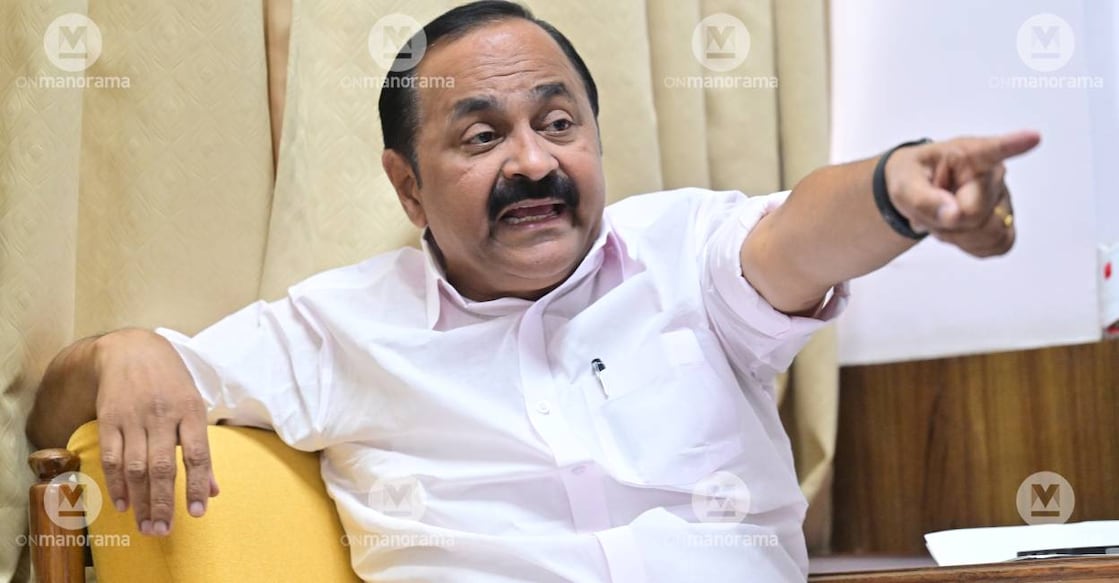Satheesan terms Govindan's claim of RSS connection a CPM love letter on bypoll eve

Mail This Article
Opposition leader V D Satheesan said CPM state secretary M V Govindan's remark that his party had an agreement with the RSS in 1977 was a "deliberate ploy" to secure votes from the BJP for the Nilambur by-election.
In an interview, Govindan claimed that the CPM had an understanding with the RSS in 1975 to overthrow Indira Gandhi and the Emergency. He sounded so unapologetic about the post-emergency pact with the RSS that he said that his party was not worried about "telling the truth".
"What made the CPM to recall this old friendship on the eve of the Nilambur election," Satheesan asked. He likened the CPM and RSS to former lovers. "This is an old flame's tender request for help, a lovelorn call for help from the RSS and BJP," he said.
Satheesan said that Govindan's remarks might seem uttered at an inopportune moment. "But in reality it is a deliberate ploy of the CPM to recall the party's old bond with the RSS using the state secretary as its mouthpiece. They are begging for votes from the RSS," he said.
A swift political backlash has forced the CPM state secretary to make a sudden about-turn. Govindan said his words were twisted out of context. He said that in 1975 the RSS was not a force to reckon with and clarified that it was Jan Sangh that was part of the multi-party experiment called the Janata Party.
In fact, the CPM was not part of the potpourri of anti-Indira parties that formed the Janata Party. It only had an electoral understanding with the Janata assemblage to the prevent the scattering of the opposition votes. Besides, the Jan Sangh was disbanded once the Janata Party was formed.
Yet, for Govindan to claim RSS links came as a big blow to the CPM on the day before Nilambur polls.
Satheesan rubbished the clarification offered by Govindan that it was a political arrangement born out of the need to defeat the Emergency.
The opposition leader also hinted that it would be unconvincing for the CPM to justify the 1975 pact with Jan Sangh in the name of Emergency. "Sundarayya resigned as general secretary of the CPM in protest against this electoral understanding with the Jan Sangh," Satheesan said. "Sundarayya's resignation letter was kept under wraps by the party. It came out only after his death," he said.
The Jan Sangh connection was the foremost of the 10 reasons Sundarayya had cited for his resignation in 1975. This is what he said: "My resignation is due to the fact that the CC majority has decided for joint actions with pro-imperialist Jana Sangh with para-military fascist (storm-trooper like RSS) as its core in the name of fighting emergency, which I consider very harmful for our party."
Satheesan said the CPM had a political understanding with the RSS not just in 1975 but also before and after. "Now they say that the understanding was only in 1975 to overthrow the Emergency. But they had a pact with the Jan Sangh in 1967. The CPM had an understanding with Samyukth Vidhayak Dal," he said.
Samyukth Vidhayak Dal was a loose anti-Congress formation that gave the Congress its first big electoral shock in 1967; it returned to power with the lowest number of seats (284) since the first general election. Both Jan Sangh and the CPM were part of the Dal.
In the post-Emergency phase, and after the birth of the BJP in 1980, Satheesan cited the formation of the National Front government in 1989. He held up a photograph from July 1989. It shows E M S Namboodirippad and Jyothi Basu along with BJP leaders A B Vajpayee and L K Advani and other National Front leaders like V P Singh. In 1989, the National Front led by V P Singh had an electoral understanding with the BJP and the Left parties like the CPM and CPI.
"In 1989, it was not Janata Party. And it was not to defeat the Emergency that they came together but to defeat Rajiv Gandhi. The CPM said they had come together in the wake of the CAG report that pointed out lapses in the purchase of the Bofors gun," Satheesan said. The opposition leader said that this CAG report, which caused the CPM to join hands with the BJP, was penned by the then Comptroller and Auditor general T N Chaturvedi who according to him was a "protector of Hindutva interests". Chaturvedi , a Padma Vibhushan recipient, joined the BJP in 1991.
"Irony is, in places like Kerala, the CPM tears apart the CAG reports," Satheesan said, a reference to the CPM's vehement objections to the CAG's stance on KIIFB borrowings.
The opposition leader said that Mohit Sen (a Communist intellectual who stood with the original CPI after the party split and had steadfastly advocated close ties with the Congress) had made a prescient remark in 1989. "He said in a piece in the Blitz magazine in 1989 that if the Left joins with communal and fascistic forces to defeat Rajiv Gandhi it would pave the way for the destruction of the Left movement in the country. It was prophetic. The two communist parties have not been able to stand properly on their two feet ever since," Satheesan said.
He said that the CPM would sup with the devil to destroy the Congress. "It had happened in 1967, in 1977, in 1989 and even now," he said.

